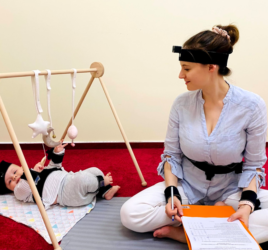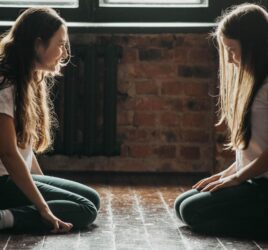
“Cool, we travel through space!”: How to elicit conceptual understanding in out-of-school activities
“Cool, we travel through space!”, “Oh look there is Saturn, that is my favorite planet!”. Guess where you are? You are enjoying a virtual journey into space in the Kapteyn Mobile Planetarium of the University of Groningen together with upper grade pupils of a primary school. It is dark inside the Mobile Planetarium, but you can feel pupils’ excitement about this unique experience! Visits to learning environments outside the regular school class, such as a visit to the Mobile Planetarium, may leave a lasting memory [1].
Out-of-school science activities are exciting, but should also evoke pupils’ conceptual understanding
There is considerable evidence showing that out-of-school science programs have a learning effect [2]. Most of the evidence points out that out-of-school visits can lead to development of personal, affective and social skills [3]. However, only scant evidence is found about the cognitive learning gains of out-of-school learning. Studies that explored the cognitive learning effects state that out-of-school education is often focused on retrieving or transferring declarative, factual, knowledge [4]. As factual knowledge is more superficial and of less importance compared to deep conceptual understanding (cf. [5]), the focus on declarative knowledge in out-of-school science programs does not result in optimal performances of pupils in terms of deep understanding.
Using a microgenetic approach the dynamic relation between pupils and instructors can be monitored and moments in which cognitive learning is trigged can be observed
As a contribution to the existing knowledge base about cognitive gains of out-of-school learning, we studied the dynamic change in complex thinking during an out-of-school program in the Mobile Planetarium [6], using a microgenetic method (e.g., [7]). The advantage of a microgenetic approach is that the learning process can be monitored while it occurs, which enables us to find out how and at which moment during the interaction, particular cognitive learning processes are triggered. A good way to measure pupils’ level of complexity in cognitive skills is by using a scale based on Skill Theory [8][9]. We also coded for declarative knowledge and conceptual understanding. As pupils learn in and through interaction with the teacher or instructor in the Mobile Planetarium, also the adult’s support in eliciting conceptual understanding was coded.
On the macro level time scale (total duration of the activity or lesson) we found a relation between the change in the support in eliciting conceptual understanding, and the change of pupils’ conceptual understanding. However, inspection of the data on the micro level time scale (seconds) revealed that pupils’ conceptual understanding and the support was not always optimally related in real-time. Sometimes pupils showed a highly complex conceptual understanding without any support of the teacher or instructor, whereas in other situations the adult showed a lot of support, which did not directly result in high-level conceptual understanding. To conclude, although on the macro level there seemed to be a relation between support and understanding, this relation might in fact be considerably more complex in real time.
It is the way in which the teacher interacts with pupils that matters
What might hinder optimal cognitive learning effects of out-of-school visits is that programs are often not adopted properly by the classroom teacher [10]. To optimize the learning effect of a out-of-school visit, it is important that the teacher of the school is actively involved in a complete program, which comprises a preparation phase, the visit, and a post-visit period. In line with previous studies, we found that it is important to implement the complete program, but even more important is the way the program is actually carried out. It seems that training teachers and instructors in supporting pupils in their development of conceptual understanding is worthwhile, as these adults show more support of pupils than untrained adults do. In the training, which was a short variant of the Curious Minds training [11] (see also Annemie’s blog post), teachers and instructors were provided with tools to use an open teaching style, focused on conceptual understanding. This open teaching style entails to ask thought provoking questions, encourage pupils to engage in the conversation, and provide think-time after a question. When the program accompanying the out-of-school visit was carried out completely and with trained teachers and instructors, the highest effects of the program were found in terms of a large increase in conceptual understanding relative to the change in declarative knowledge.
To conclude, in our study we found that conceptual understanding was not gradually increasing, but followed a pathway of high level-bursts. In the interaction, which was also characterized by (support in) declarative knowledge, non-complexity and no support, moments of increased understanding were found, and these moments were often – but not always – preceded by high levels of support.
Relevant links and publications



